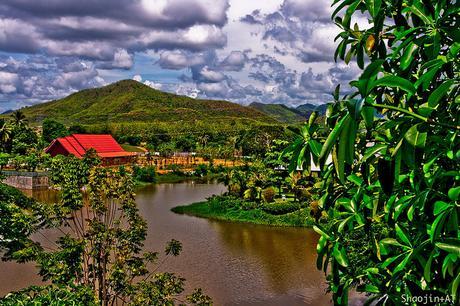Ecotourism (also called sustainable tourism) can be defined by a variety of travel practices, but it all comes down to a general set of ideas. As an eco-tourist, you decide to travel in a way that shows respect to nature and does not contribute to its degradation.
Additionally, ecotourism is a part of environmental conservation, and understanding what the needs of the people are who are local to the area so that you can help to improve their quality of life. It also involves learning more about the history of other cities and preserving the historical landmarks.
As per The International Ecotourism Society,
“Ecotourism is now defined as “responsible travel to natural areas that conserves the environment, sustains the well-being of the local people, and involves interpretation and education” (TIES, 2015). Education is meant to be inclusive of both staff and guests.”

Importance of Ecotourism
When we think of the joys that come with the adventures of traveling, we often envision exciting trips to beautiful places fit for a perfect photograph, unique foods you won’t find at home, and encounters with people who are much different from those we are accustomed to. Tourism allows us to do more than just learn facts about various locations. It allows us to immerse ourselves into the cultures and lifestyles of others and leaves lasting impressions that aren’t likely to be forgotten.
Ecotourism is valuable for people and the Planet
The rewards that come with the newness and the satisfying learning experiences of travel are irreplaceable, and these benefits can be enhanced through ecotourism. As an eco-tourist, you travel with more than personal satisfaction in mind. You help the planet and you enable people to lead a more fulfilling life.
Local communities, especially those that do not thrive by industrial means, could benefit greatly from tourists who respect their lands while providing additional funding. In unspoilt regions, we are offered a touring experience that reminds us of nature’s enchanting qualities and we are commonly introduced to welcoming residents.
Sustainable tourism is a learning experience for everyone involved
The more that we know about a place, our love and admiration grows and inspires us to protect it. Tour guides and hosts are educated on a deeper level in order to share knowledge with visitors while tourists come to appreciate the beauty of new surroundings. Adding to the visual appeal is the new perspective that comes with learning the historical and environmental significance of unfamiliar lands and buildings.
As we explore unknown places with a spirit of curiosity and kindness, we begin important discussions with locals and other visitors. Through their stories, we have an inside view of what the needs and desires of the people are.
Unfortunately, tourists are viewed by some as rude visitors who create inconveniences for residents. Locals are often annoyed by the increased traffic, unreasonable demands and the inability of tourists to understand and respect the cultural expectations and dress codes.
When you meet people as you travel sustainably, mutual understanding allows all parties involved to learn about one another. You are able to tell others where you are from and to show them that you would like to tour the area without disturbing their way of life or disrespecting their values. By showing strangers that you care about their feelings and concerns, they view you as a representative of your home and as an ally. This creates a sense of unity and cultural sensitivity.
Ecotourism Promotes Economic Stability
We live in a very diverse world full of eclectic people who live off the land and depend on what nature provides. Commercial tourist attractions may be placed in a specific area, but that doesn’t mean it gives back to these communities. Instead, large corporations tend to change the way of living for some natives depending on what will be most profitable. When this happens, locals often relocate and are devastated on both a physical and emotional level due to the stresses that come with moving.
Many of these indigenous cultures have been deluded, or destroyed altogether, to set up for tourism, but it doesn’t have to be that way. Traveling to local attractions offers exciting experiences and the funding you provide to these places is shared amongst the community, contributing to more jobs and a boost in the local economy.
We Become More Sensitive Through Ecotourism
Unfortunately, many of the travel experiences we take part in do not take into consideration how it affects our planet and the well-being of people. There are many popular attractions that are insensitive to the environment and animals. These places continue to make a large amount of money because many people are unaware of the harm and pain it causes, simply viewing it as amusement. On the other hand, lesser known attractions may not be able to advertise or host a large number of guests at once, but deserve the publicity and funding to help them move forward. When we visit these places and tell others about the experience, we are helping to promote eco-friendly businesses and keep them in operation.
Ecotourism Reduces our Carbon Footprint
When you travel, commuting is a major part of the experience. Some choose to rent cars and drive while others take planes or trains. Commuting is unavoidable when traveling, but there are adventurous ways to cut back on transport that adds to pollution in the air. While on a trip, explore guided areas that offer tours on foot. Have fun discovering the unique types of shared transportation that each city provides, such as trolleys and hybrid buses that offer comfortable means of travel for tourists and locals.
Animals Suffer When We Don’t Travel Sustainably
Small companies are working to save species from extinctions and monetary support helps them in this mission. At many major attractions, animals are unfairly caged or forced to participate in performances that cause them stress and discomfort. Instead of paying to view animals in captivity, go sightseeing to see them at play in their natural habitats. There are also hiking trails waiting to be explored that offer colorful views of nature and close encounters with diverse species.
Planning to Travel Sustainably is Easier Than Ever Before
Tourism is amongst, if not the, most popular industry in the world. The less sustainably we travel, the more we allow for destructive habits that negatively impact the environment. For example, there are large amounts of litter and waste often left behind when a large number of people congregate at events that do not encourage the use of recycling bins, contributing greatly to pollution.
Because of its ability to attract and connect people, travel can be especially powerful as a way to preserve the environment instead. Proper planning and research allow tourists to find eco-friendly alternatives that are enjoyable for both solo travelers and families. There are lots of online tools and travel companies that can help you to book incredible experiences that are kind to the environment. With so many advancements in technology, you can easily plan your own trips to various destinations in a short amount of time if a travel consultant isn’t a desirable option.

Principles of Ecotourism
Ecotourism is about responsible travel to natural areas that promote conservation, bring harmony among communities, and sustains well being of local people. People who implement and participate in ecotourism activities should adopt the following ecotourism principles:
- Minimize physical, social, behavioral, and psychological impacts
- Build environmental and cultural awareness and respect
- Provide positive experiences for both visitors and local people
- Provide direct financial benefits for environmental conservation
- Generate financial benefits for both local people and private industry
- Deliver memorable interpretative experiences to visitors that help raise sensitivity to host countries’ political, environmental, and social climates
- Design, construct and operate low-impact facilities
Variety of Benefits of Ecotourism
- As you travel, not only do you learn about others and teach them about your ways of life, you also learn more about yourself than you could imagine. Ecotourism gives us a completely different view of the world and challenges us open our minds to different ways of thinking.
- Enjoy the different varieties of music and styles of dress that you will be introduced to during your travels. People watch to see how intriguing the interactions between locals can be. Many places have live outdoor performances where you can dance and mingle with locals who enjoy sharing stories and meeting tourists. You can spend the day in bathing suits and surfboards or in formal wear at opera performances. You’ll notice that no matter where you travel, there are distinctive experiences to be had.
- Everyone craves a sense of excitement in their lives and eco-travel entertains the thrill seeker in you. There are many sustainable adventures on land and below the water. Go scuba diving and snorkeling to explore the depths of the water without disturbing marine life and coral, or hike and zipline through the forests.
- Your vocabulary also increases as you take on different accents and learn terms that you were unfamiliar with, making you a more well-rounded speaker. This can be beneficial in professional settings and adds a sense of excitement when you return home to share the long- lasting memories you’ve made.
- History takes on a life of its own for eco-tourists. If you want to feel like you’ve traveled back in time, you can tap into the feeling, the food, and the atmosphere of past places based on where you decide to visit. Take a tour of cities with preserved and restored buildings that have historical and religious value. Castles and landmarks of major events that shaped the history and politics of various places can often be toured, and the architecture and design alone will amaze you.
- Keepsakes are always original and can keep you enlightened on the darkest days. You can create your own souvenirs with photographs you take of incredible places or show the locals that you support their talents by purchasing handcrafted items they’ve made.
- The impossible doesn’t seem as impossible anymore. There are so many places we see that are beautiful and they seem so far away. When you finally reach that dream destination, you are showing yourself that the impossible can be achieved and you can make your wildest dreams come true.

